Dear Zazie, Here is today’s Lovers’ Chronicle from Mac Tag dedicated to his muse. Follow us on twitter @cowboycoleridge. Rhett
The Lovers’ Chronicle
Dear Muse,
oh so many with us
“Let me count the ones”
readin’ Nin and Auden today
“Anaïs was a great one
for seizing opportunities”
yes, for not settlin’,
searchin’ for the marvelous
“I like the truly faithless quote”
none of that here, no fractions,
no denyin’ as we create another
© copyright 2023 mac tag/cowboycoleridge all rights reserved
the past is not past
it is right here
right now in front of us
let the livin’ vision be
complete, to us
the entirety
how should we have it
with a passion
unlike anything
let it be
the more
rare bliss
and surely it will be
about a time
a lover’s kiss
all that matters
© copyright 2021 mac tag/cowboycoleridge all rights reserved
© copyright 2020 mac tag/cowboy coleridge all rights reserved
i will, till we meet…
over the mountain
to the ocean
and the stars in the sky
your hands in water
stare in wonder
at what we have missed
the wind blows in the eves,
the desert sighs in the bed,
and the crack in the emptiness
opens a lane to the light ahead
© copyright 2019 mac tag/cowboy coleridge all rights reserved
lay your sleepin’ head
sorrow fades away
in my arms till first light
let the livin’ vision be
complete, to us
the entirety
how should we have it
with a passion
unlike anything
let it be
the more
rare bliss
but, surely it can be
about a time
a lover’s kiss
all that matters
© copyright 2018 mac tag/cowboy coleridge all rights reserved
if not a fever, then for sure
an obsession with creation
in an attempt to recapture
lost years
to create a dream,
embrace an existence
where beauty and sorrow
come in preparation
for solitude
the opium den
of remembrance
you believe you are,
but you are not
you are merely
hibernatin’
the symptoms are plain…
monotony, the absence
of marvelous
many live like this,
many die like this
without knowin’
for the lucky,
a shock happens
a place, a person,
a book, a song,
awakens them
and they discover
they think,
in the order and disorder
in which they feel
they follow sensations
and correlations,
however absurd,
of events and images,
they trust the new realms
they are lead into
the marvelous, the mysterious,
the cult of the unconscious
as proclaimed by Rimbaud
it is not madness
it is transcendin’
the rigidities and the patterns
made by the insensate mind
ordinary, does not interest
seekin’ only the high moments
for you, for me
the highest moment,
losin’ ourselves in each other
© copyright 2017 mac tag/cowboy Coleridge all rights reserved
Today is the birthday of Pyotr Petrovich Konchalovsky (Izyumsky Uyezd, Russian Empire 21 February 1876 – 2 February 1956 Moscow); painter, a member of the Knave of Diamonds group.
His public debut was at the Salon des Indépendants exhibition in Paris, 1908, but Konchalovsky soon returned to Moscow, bringing with him new ideas (elements of his work from this period have been identified as “Fauvist”), as well as his more respectable Salon training.
By 1909, he was exhibiting frequently, participating in the Golden Fleece, Fraternity, Mir Iskusstva, and New Society of Artists. He was a founding member of the society Knave of Diamonds in 1909, a rebellious, avant-guard group seeking to synthesize the modern art breakthroughs of French and German styles with Russian primitivism. Where Western European looked to primitive African sculptures for artistic refreshment and inspiration, these Russian painters imagined they could turn to “indigenous” Russian works. Konchalovsky was elected as the group’s chairman in 1911.
Pyotr married a daughter of painter Vasily Surikov, who always praised the art of his son-in-law.
Gallery
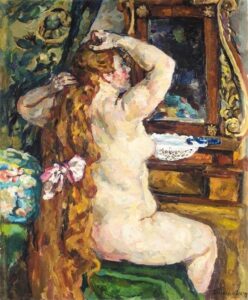
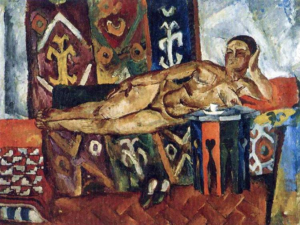
Scheherazade 1917
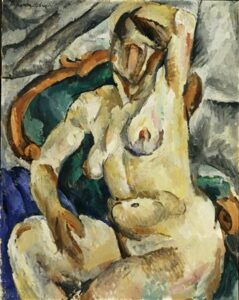
The model in a chair
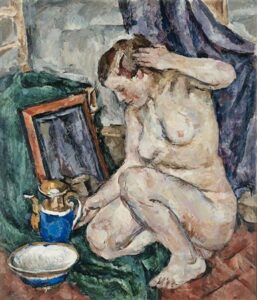
Model squatting
| Anaïs Nin | |
|---|---|
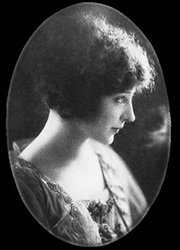
Portrait of Nin, c. 1920
|
|
Today is the birthday of Anaïs Nin (born Angela Anaïs Juana Antolina Rosa Edelmira Nin y Culmell; Neuilly-sur-Seine; February 21, 1903 – January 14, 1977 Los Angeles); essayist and memoirist born to Cuban parents in France, where she was also raised. She spent some time in Spain and Cuba, but lived most of her life in the United States, where she became an established author. She wrote journals (which span more than 60 years, beginning when she was 11 years old and ending shortly before her death), novels, critical studies, essays, short stories, and erotica. A great deal of her work, including Delta of Venus and Little Birds, was published posthumously.
On March 3, 1923, in Havana, Cuba, Nin married her first husband, Hugh Parker Guiler (1898–1985), a banker and artist, later known as “Ian Hugo” when he became a maker of experimental films in the late 1940s. The couple moved to Paris the following year, where Guiler pursued his banking career and Nin began to pursue her interest in writing. In her diaries she also mentions having trained as a flamenco dancer in Paris in the mid-to-late 1920s.
Nin met her second husband, Rupert Pole met in an elevator as both were en route to a party given by an heir to the Guggenheim fortune. He was 28 and she was 44 at the time. In her diary entry that evening, Nin noted his emotional sensitivity and knowledge of Eastern philosophies and concluded the entry with “Danger! He is probably homosexual.”
Pole, who was under the impression that Nin had divorced Guiler, asked Nin to accompany him to the West Coast. Nin agreed to do so, but told Guiler she was accompanying a friend on a drive to Las Vegas. He and Nin lived a rustic life in a cabin in the Sierra Madre, where Nin introduced herself as Mrs. Anaïs Pole even though she was still married to Guiler. Nin referred to her simultaneous marriages as her “bicoastal trapeze”. Nin said, “I tell so many lies I have to write them down and keep them in the lie box so I can keep them straight.”
Nin and Pole were married by a justice of the peace in Quartzsite, Arizona, on March 17, 1955. She kept her marriage to Guiler secret from Pole for 11 years, but concern about the legal consequences of having two men claim her as a dependent on their tax returns led her to arranging the annulment in 1966 of the marriage with Pole.
Nin remained married to Guiler, citing his decades of financial support, but spent her final years with Pole. She and Pole lived in a small house in Los Angeles’ Silver Lake neighborhood that Pole had built with money saved from his job as forest ranger and later as a science teacher at Thomas Starr King Junior High School in Los Angeles.
According to her diaries, Vol.1, 1931–1934, Nin shared a bohemian lifestyle with Henry Miller during her time in Paris. Her husband Guiler is not mentioned anywhere in the published edition of the 1930s parts of her diary (Vol. 1–2) although the opening of Vol. 1 makes it clear that she is married, and the introduction suggests her husband refused to be included in the published diaries. The diaries edited by Pole, after her death, tell that her union with Henry Miller was very passionate and physical, and that she believed that it was a pregnancy by him that she aborted in 1934.
Her passionate love affair and friendship with Miller strongly influenced her both sexually and as an author. Nin wrote about her infatuation with the Surrealist artist Bridget Bate Tichenor in her diaries. Claims that Nin was bisexual were given added circulation by her apparent attraction to Miller’s second wife June. The first unexpurgated portion of Nin’s journal to be published, Henry and June, makes it clear that Nin was stirred by June to the point of saying (paraphrasing), “I have become June,” though it is unclear whether she consummated her feelings for her sexually. To both Anaïs and Henry, June was a femme fatale—irresistible, cunning, erotic. Nin gave June money, jewelry, clothes, often leaving herself broke.
Nin often cited authors Djuna Barnes and D. H. Lawrence as inspirations. She states in Volume One of her diaries that she drew inspiration from Marcel Proust, André Gide, Jean Cocteau, Paul Valéry, and Arthur Rimbaud.
Prose
Only in the fever of creation could she recreate her own lost life.
- Winter of Artifice (1939)
- In the world of the dreamer there was solitude: all the exaltations and joys came in the moment of preparation for living. They took place in solitude. But with action came anxiety, and the sense of insuperable effort made to match the dream, and with it came weariness, discouragement, and the flight into solitude again. And then in solitude, in the opium den of remembrance, the possibility of pleasure again.
- Children of the Albatross (1947)
- This image of herself as a not ordinary women, an image which was trembling now in his eyes, might suddenly disappear. Nothing more difficult to live up to than men’s dreams.
- Children of the Albatross (1947)
- You live like this, sheltered, in a delicate world, and you believe you are living. Then you read a book (Lady Chatterley, for instance), or you take a trip, or you talk with Richard, and you discover that you are not living, that you are hibernating. The symptoms of hibernating are easily detectable: first, restlessness. The second symptom (when hibernating becomes dangerous and might degenerate into death): absence of pleasure. That is all. It appears like an innocuous illness. Monotony, boredom, death. Millions live like this (or die like this) without knowing it. They work in offices. They drive a car. They picnic with their families. They raise children. And then some shock treatment takes place, a person, a book, a song, and it awakens them and saves them from death.
- The Diary of Anaïs Nin , Volume One 1931-1934
- I had always believed in Andre Breton’s freedom, to write as one thinks, in the order and disorder in which one feels in thinks, to follow sensations and absurd correlations of events and images, to trust to the new realms they lead one into. “The cult of the marvelous.” Also the cult of the unconscious leadership, the cult of mystery, the evasion of false logic. The cult of the unconscious as proclaimed by Rimbaud. It is not madness. It is an effort to transcend the rigidities and the patterns made by the rational mind.
- Winter, 1931-1932 The Diary of Anaïs Nin , Volume One 1931-1934
- Ordinary life does not interest me. I seek only the high moments. I am in accord with the surrealists, searching for the marvelous.
- Winter, 1931-1932
- The truly faithless one is the one who makes love to only a fraction of you. And denies the rest.
- February, 1932
- For you and for me the highest moment, the keenest joy, is not when our minds dominate but when we lose our minds…
- February, 1932
- My life is slowed up by thought and the need to understand what I am living.
- February, 1932
- Passion gives me moments of wholeness.
- February, 1932
- We don’t have a language for the senses. Feelings are images, sensations are like musical sounds.
- February, 1932
- Man can never know the kind of loneliness a woman knows. Man lies in a woman’s womb only to gather strength, he nourishes himself from this fusion, and then he rises and goes into the world, into his work, into battle, into art. He is not lonely. He is busy. The memory of the swim in amniotic fluid gives him energy, completion. The woman may be busy too, but she feels empty. Sensuality for her is not only a wave of pleasure in which he has bathed, and a charge of electric joy at contact with another. When man lies in her womb, she is fulfilled, each act of love is a taking of man within her, and act of birth and rebirth, of child bearing and man bearing. Man lies in her womb and is reborn each time anew with a desire to act, to BE. But for a woman, the climax is not in the birth, but in the moment when man rests inside of her.
- May 25, 1932
- Women always think that when they have my shoes, my dress, my hairdresser, my makeup, it will all work the same way. They do not conceive of the witchcraft that is needed. They do not know that I am not beautiful but that I only appear to be at certain moments.
- June 1932 Henry and June
- Nothing too long imagined can be perfect in a worldly way.
- June 1932 Henry and June
- Love reduces the complexity of living.
- June 1932 Henry and June
- The basis of insincerity is the idealized image we hold of ourselves and wish to impose on others.
- July 1932, The Diary Of Anaïs Nin, Volume One (1931-1934)
- To lie, of course, is to engender insanity.
- August 1932 Henry and June
- I see myself wrapped in lies, which do not seem to penetrate my soul, as if they are not really a part of me. They are like costumes.
- August 1932 Henry and June
- There will never be darkness because in both of us there’s always movement, renewal, surprises. I have never known stagnation. Not even introspection has been a still experience…
- August 1932 Henry and June
- You are so terribly nimble, so clever. I distrust your cleverness. You make a wonderful pattern, everything is in its place, it looks convincingly clear, too clear. And meanwhile, where are you? Not on the clear surface of your ideas, but you have already sunk deeper, into darker regions, so that one only thinks one has been given all your thoughts, one only imagines you have emptied yourself in that clarity. But there are layers and layers — you’re bottomless, unfathomable. Your clearness is deceptive. You are the thinker who arouses most confusion in me, most doubt, most disturbance.
- August 1932 Henry and June
- This abdication of life demanded of the artist is to be achieved only relatively. Most artists have retired too absolutely; they grow rusty, inflexible to the flow of currents.
- November 26, 1932
- I postpone death by living, by suffering, by error, by risking, by giving, by losing.
- March, 1933
- I disregard the proportions, the measures, the tempo of the ordinary world. I refuse to live in the ordinary world as ordinary women. To enter ordinary relationships. I want ecstasy. I am a neurotic — in the sense that I live in my world. I will not adjust myself to the world. I am adjusted to myself.
- March 25, 1933
- I need a place where I can shout and weep. I have to be a Spanish savage at some time of the day. I record here the hysteria life causes in me. The overflow of an undisciplined extravagance. To hell with taste and art, with all contractions and polishings. Here I shout, I dance, I weep, I gnash my teeth, I go mad — all by myself, in bad English, in chaos. It will keep me sane for the world and for art .
- Oct. 27, 1933 (writing about her diary)
- When others asked the truth of me, I was convinced it was not the truth they wanted, but an illusion they could bear to live with.
- November, 1933
- For me, the adventures of the mind, each inflection of thought, each movement, nuance, growth, discovery, is a source of exhilaration.
- November, 1933
- People living deeply have no fear of death.
- The Diary Of Anais Nin, Volume Two (1934-1939)
- He was insane with anger. Or is all insanity anger?
- The Diary Of Anais Nin, Volume Two (1934-1939)
- You cannot save people, you can only love them.
- The Diary Of Anais Nin, Volume Two (1934-1939)
- I have so strong a sense of creation, of tomorrow, that I cannot get drunk, knowing I will be less alive, less well, less creative the next day.
- The Diary Of Anais Nin, Volume Two (1934-1939)
- Someday I’ll be locked up for love insanity. “She loved too much.”
- The Diary Of Anais Nin, Volume Two (1934-1939)
- The times in his studio when he washed his hands and they smoked, for his hands were so warm and the water so cold.
- The Diary Of Anais Nin, Volume Two (1934-1939)
- The body is an instrument which only gives off music when it is used as a body. Always an orchestra, and just as music traverses walls, so sensuality traverses the body and reaches up to ecstasy.
- The Diary Of Anais Nin, Volume Two (1934-1939)
- He left me at my hotel at 3:00 AM murmuring: “You’re marvelous.”
- The Diary Of Anais Nin, Volume Two (1934-1939)
- I seek the real stuff of life. Profound drama.
- February 5, 1934
- Oh, God, I know no joy as great as a moment of rushing into a new love, no ecstasy like that of a new love. I swim in the sky; I float; my body is full of flowers, flowers with fingers giving me acute, acute caresses, sparks, jewels, quivers of joy, dizziness, such dizziness. Music inside of one, drunkenness. Only closing the eyes and remembering, and the hunger, the hunger for more, more, the great hunger, the voracious hunger, and thirst.
- May 30, 1934
- No one but a woman in love ever sees the maximum of men’s greatness .
- June 18, 1934
- I am an excitable person who only understands life lyrically, musically, in whom feelings are much stronger as reason. I am so thirsty for the marvelous that only the marvelous has power over me. Anything I can not transform into something marvelous, I let go. Reality doesn’t impress me. I only believe in intoxication, in ecstasy, and when ordinary life shackles me, I escape, one way or another. No more walls.
- July 7, 1934
- Love is the axis and breath of my life. The art I produce is a byproduct, an excrescence of love, the song I sing, the joy which must explode, the overabundance — that is all!
- Oct. 21, 1934
- We do not grow absolutely, chronologically. We grow sometimes in one dimension, and not in another, unevenly. We grow partially. We are relative. We are mature in one realm, childish in another. The past, present, and future mingle and pull us backward, forward, or fix us in the present. We are made of layers, cells, constellations.
- The Diary of Anaïs Nin Vol. 4 (1971); as quoted in Journal of Phenomenological Psychology Vol. 15 (1984)
- In creation alone there is the possibility of perfection.
- May 11, 1935, published in Fire : From “A Journal of Love” : the Unexpurgated Diary of Anaïs Nin, 1934-1937 (1995)
- I miss the animal buoyancy of New York, the animal vitality. I did not mind that it had no meaning and no depth.
- June, 1935
- Everything but happiness is neurosis.
- Feb. 15, 1936
- Experience teaches acceptance of the imperfect as life.
- Feb. 15, 1936
- No desire of the body, but for what lies in there, what lies in the flesh, the world, the thought, the creation, the illumination.
- March 2, 1936 Fire
- To withhold from living is to die … the more you give of yourself to life the more life nourishes you.
- March 6, 1936 Fire
- I say quotations are literary. They are good only when dealing with ideas, not with experience. Experience should be pure, unique.
- June 5, 1936 Fire
- I have an attitude now that is immovable. I shall remain outside of the world, beyond the temporal, beyond all the organizations of the world. I only believe in poetry.
- August 22, 1936 Fire
- Ecstasy is the moment of exaltation from wholeness!
- September 10, 1936
- Creation which cannot express itself becomes madness.
- October 18, 1936 Fire
- Each friend represents a world in us, a world possibly not born until they arrive, and it is only by this meeting that a new world is born.
- March 1937
- There are very few human beings who receive the truth, complete and staggering, by instant illumination. Most of them acquire it fragment by fragment, on a small scale, by successive developments, cellularly, like a laborious mosaic.
- Fall 1943
- Anxiety is love’s greatest killer. It creates the failures. It makes others feel as you might when a drowning man holds on to you. You want to save him, but you know he will strangle you with his panic.
- February 1947 The Diary of Anaïs Nin Vol. 4 (1944-1947), p. 185
- Why one writes is a question I can answer easily, having so often asked it of myself. I believe one writes because one has to create a world in which one can live. I could not live in any of the worlds offered to me — the world of my parents, the world of war, the world of politics. I had to create a world of my own, like a climate, a country, an atmosphere in which I could breathe, reign, and recreate myself when destroyed by living. That, I believe, is the reason for every work of art.
- February 1954 The Diary of Anaïs Nin Vol. 5 (1947-1955), as quoted in Woman as Writer (1978) by Jeannette L. Webber and Joan Grumman, p. 38
- The artist is the only one who knows that the world is a subjective creation, that there is a choice to be made, a selection of elements. It is a materialization, an incarnation of his inner world. Then he hopes to attract others into it. He hopes to impose his particular vision and share it with others. And when the second stage is not reached, the brave artist continues nevertheless. The few moments of communion with the world are worth the pain, for it is a world for others, an inheritance for others, a gift to others, in the end. When you make a world tolerable for yourself, you make a world tolerable for others.
We also write to heighten our own awareness of life. We write to lure and enchant and console others. We write to serenade our lovers. We write to taste life twice, in the moment, and in retrospection. We write, like Proust, to render all of it eternal, and to persuade ourselves that it is eternal. We write to be able to transcend our life, to reach beyond it. We write to teach ourselves to speak with others, to record the journey into the labyrinth. We write to expand our world when we feel strangled, or constricted, or lonely. We write as the birds sing, as the primitives dance their rituals. If you do not breathe through writing, if you do not cry out in writing, or sing in writing, then don’t write, because our culture has no use for it. When I don’t write, I feel my world shrinking. I feel I am in a prison. I feel I lose my fire and my color. It should be a necessity, as the sea needs to heave, and I call it breathing.- February 1954 The Diary of Anaïs Nin, Vol. 5 as quoted in Woman as Writer (1978) by Jeannette L. Webber and Joan Grumman, p. 38
- One handles truths like dynamite. Literature is one vast hypocrisy, a giant deception, treachery. All writers have concealed more than they revealed.
- The Diary of Anaïs Nin, Vol. 5
- The role of the writer is not to say what we can all say, but what we are unable to say. Most of the writing today which is called fiction contains such a poverty of language, such triteness, that it is a shrunken, diminished world we enter, poorer and more formless than the poorest cripple deprived of ears and eyes and tongue. The writer’s responsibility is to increase, develop our senses, expand our vision, heighten our awareness and enrich our articulateness.
- The Diary of Anaïs Nin, Vol. 5, as quoted in Moving to Antarctica : An Anthology of Women’s Writing (1975) by Margaret Kaminski
- I would say that compassion for our parents is the true sign of maturity.
- The Diary of Anaïs Nin, Vol. 5
- At a lecture I am asked to pronounce my name three times. I try to be slow and emphatic, “Anaïs — Anaïs — Anaïs. You just say “Anna” and then add “ees,” with the accent on the “ees.”
- Summer 1966, in The Diary Of Anais Nin, Volume 7 (1966-1974)
| W. H. Auden | |
|---|---|
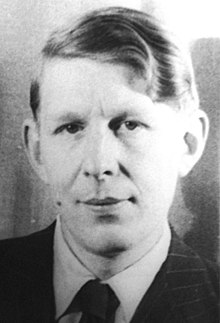
Auden in 1939 (from the Library of Congress)
|
|
Today is the birthday of Wystan Hugh Auden (York 21 February 1907 – 29 September 1973 Vienna); poet, who later became an American citizen. Perhaps best known for love poems such as “Funeral Blues,” poems on political and social themes such as “September 1, 1939” and “The Shield of Achilles,” poems on cultural and psychological themes such as The Age of Anxiety, and poems on religious themes such as “For the Time Being” and “Horae Canonicae.” In 1939 he moved to the United States and became an American citizen in 1946.
Auden’s poetry was noted for its stylistic and technical achievement, its engagement with politics, morals, love, and religion, and its variety in tone, form and content. He won the Pulitzer Prize in Poetry for his 1947 long poem The Age of Anxiety, the title of which became a popular phrase describing the modern era.
Verse
Lay your sleeping head, my love
Human on my faithless arm;
Time and fevers burn away
Individual beauty from
Thoughtful children, and the grave
Proves the child ephemeral;
But in my arms till break of day
Let the living creature lie:
Mortal, guilty, but to me
The entirely beautiful.
- Lay your sleeping head, my love (1937) Lines 1-2, Written January 1937; also known as Lullaby.
How should we like it were stars to burn
With a passion for us we could not return?
If equal affection cannot be,
Let the more loving one be me.
- The More Loving One (1957)
- Marriage is rarely bliss
But, surely it would be worse
As particles to pelt
At thousands of miles per sec
About a universe
In which a lover’s kiss
Would either not be felt
Or break the loved one’s neck.- After Reading a Child’s Guide to Modern Physics (1961) Lines 9-16
- Thoughts of his own death,
like the distant roll
of thunder at a picnic.- Marginalia (1965-68)
Funeral Blues (1936)
- First version written 1936, final version 1938; also known as “Stop all the clocks”
- Stop all the clocks, cut off the telephone,
Prevent the dog from barking with a juicy bone.
Silence the pianos and with muffled drum
Bring out the coffin, let the mourners come.
- He was my North, my South, my East and West,
My working week and my Sunday rest,
My noon, my midnight, my talk, my song;
I thought that love would last for ever: I was wrong.
- The stars are not wanted now; put out every one,
Pack up the moon and dismantle the sun,
Pour away the ocean and sweep up the woods;
For nothing now can ever come to any good.
As I Walked Out One Evening (1937)
- Written November 1937
- I’ll love you, dear, I’ll love you
Till China and Africa meet,
And the river jumps over the mountain
And the salmon sing in the street,I’ll love you till the ocean
Is folded and hung up to dry
And the seven stars go squawking
Like geese about the sky.
- ‘O plunge your hands in water,
Plunge them in up to the wrist;
Stare, stare in the basin
And wonder what you’ve missed. - ‘The glacier knocks in the cupboard,
The desert sighs in the bed,
And the crack in the tea-cup opens
A lane to the land of the dead.’ - Lines 37-44
Behind the corpse in the reservoir, behind the ghost on the links,
Behind the lady who dances and the man who madly drinks,
Under the look of fatigue, the attack of migraine and the sigh
There is always another story, there is more than meets the eye.
Mac Tag

No Comments on "The Lovers’ Chronicle 21 February – moments – art by Pyotr Konchalovsky – birth of Anaïs Nin – verse by W. H. Auden"